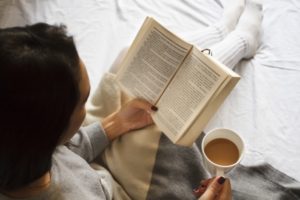 As the days continue to get shorter, you may find your vision a little blurrier and the headaches a little more frequent—especially if you curl up with a book or magazine in the afternoon. As the sun lowers and the room becomes darker, your eyes have to work harder to track the words on the page.
As the days continue to get shorter, you may find your vision a little blurrier and the headaches a little more frequent—especially if you curl up with a book or magazine in the afternoon. As the sun lowers and the room becomes darker, your eyes have to work harder to track the words on the page.
You may wonder if reading in the dark is damaging to your eyes, and if it increases the risk for conditions like cataracts, age-related macular degeneration (AMD), or glaucoma. After all, if your eyes are hurting and you’re struggling to see, both during and slightly after reading, it can be scary. But don’t worry—contrary to popular belief, you are not hurting the overall health of your eyes by reading as the sun goes down, even if it feels like it.
Advertisement
Within a few minutes of putting your reading glasses on, brightening up the room a little bit, or putting the book down, the pain and blurriness will likely subside. Your eyes just needed a bit of a rest.
The more severe conditions mentioned above would typically cause more regular symptoms. Vision would become spotty, peripheral vision would be compromised, or you may experience “floaters” in your vision. These symptoms should get you to the eye doctor as soon as possible.
But if you’re looking for ways to deal with tiring eyes while reading, there are a few things you can try. One is spending more time outdoors. A review of American and Australian studies found that when children spent more time outdoors, they were less likely to develop myopia, or near-sightedness (which can cause blurry vision). One theory is that being outdoors in the light caused them to look further in the distance, improving the overall strength of their eyes. This conclusion, however, is strictly a theory.
You can also take breaks by looking away from your reading material for 20 seconds every 20 minutes to focus on something about 20 feet away, otherwise known as the 20-20-20 rule. And if that doesn’t work for you, turn on the lights—just have them set so they don’t create a shadow on your page!
